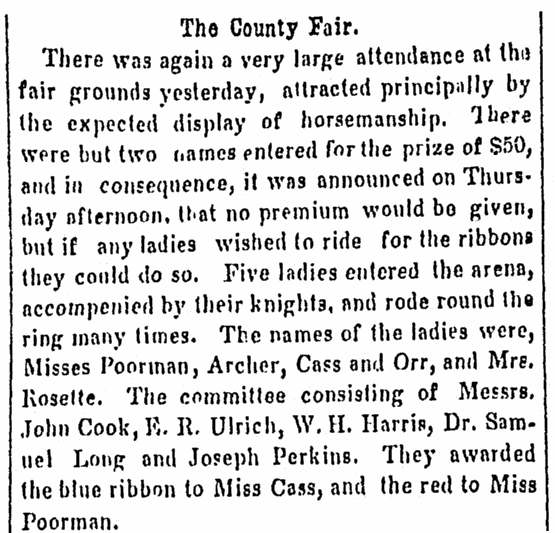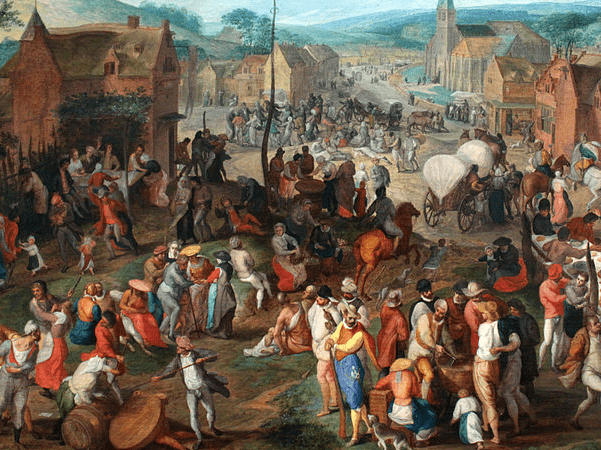Introduction: In this blog article, Mary Harrell-Sesniak demonstrates an important genealogy search tip: stories about your ancestors can be found in all parts of the newspaper. Consider, for example, articles about blue ribbon contest winners at country fairs. Mary is a genealogist, author and editor with a strong technology background.
An online collection of newspapers, such as GenealogyBank’s Historical Newspaper Archives, is a great resource for genealogy research. But don’t just stop at the obvious choices: birth notices, wedding announcements, and obituaries. Stories about your ancestors can be found in all parts of the newspaper. Consider, for example, articles about the local, county or state fair.
It’s the rare family that didn’t attend a country fair – and many had a family member who won a blue ribbon. Perhaps the local newspaper wrote a nice article about your ancestor when he or she won the blue ribbon at the local fair.
It may have been your Aunt Be, Uncle Mo, Cousin Shirley or Grandpa Joe. Do yourself a favor and go look for these sweet tidbits of family memorabilia. They were almost always featured in old newspapers.
When researching old newspaper articles about fairs, don’t stop at the obvious keyword searches such as: livestock, quilts, and pies. Many other fun and unusual awards were bestowed. Here are some of my picks of Americana blue ribbon awards.
Horsemanship
Starting from a very early time, country fairs offered financial prizes for horsemanship.
In 1855 there were not enough contestants for the prize at an Illinois county fair, so the judges announced there would be no financial premium (a first place prize of $50 had been offered originally).

However, the judges did present two ribbons among five ladies who rode for the honors, “accompanied by their knights.” Misses Poorman, Archer, Cass and Orr, along with Mrs. Rosette, “rode around the ring many times” in front of the spectators. Miss Cass took home the blue ribbon and Miss Poorman the red.
By the early 1920s, photos accompanied the newspaper articles about ribbon winners at the fair. This one depicts Miss Katherine Kennedy Tod riding her horse Sceptre; they won the blue ribbon “in the saddle horse class ridden by boy or girl not over sixteen.”
If you search GenealogyBank’s Historical Newspaper Archives as well as the Web, you’ll find that Miss Tod won a number of other prizes for horsemanship in her riding career.
Blue Ribbon Babies
Who doesn’t love a baby photo!
Many babies of yesteryear were dressed in their cutest garb and taken to the fair – and entered in contests.
In 1921, Mrs. Anna McNamara displayed her two-year-old daughter Nancy at the Long Island fair.
She won for being the prettiest and healthiest of the babies out of hundreds entered – and don’t you adore the little shoes and her mama’s hat. Just an observation, but perhaps the lack of a beaming smile tells us the little girl struck too many poses that day.
Root Beer – Better than Beer
I’m sure many people from 1920 – and even today – would agree that root beer is better than beer. Becker Products won the blue ribbon at the Utah State Fair in 1920 for its root beer, and this photograph appeared in the local newspaper. This image was timely, coming as it did right before the country entered into the prohibition of liquor.
Scientific American’s Flying Machines (Heavier than Air) Trophy
Although not a blue ribbon contest per se, when aviation fever hit the United States there were many prizes awarded. One was a magnificent trophy from the Scientific American valued at $2,500 that was awarded in 1907. The prestige of blue ribbon trophies was echoed in this article’s text:
The trophy is valued at $2,500 and its beauty at once brings to the lips the words “Blue Ribbon of the Air.”
It’s thought that these prizes spurred the rapid advancement of air travel in the United States. If this is one of your interests, go look for more details in the old newspapers. There are many lovely reports, including the names of winners.
Bicycle Races
Aviation wasn’t the only transportation method of contests.
In 1901, Bobbie Walthour of Atlanta, Georgia, won a six-day bicycle race that ended at Park Square Garden. Once again, the prestige of blue ribbon trophies was echoed in this article’s text:
Hardly a foot separated Stinson from the leader [Walthour], and these two demonstrated beyond question that they were far superior to even the redoubtable foreigners who came to America for the purpose of winning these blue ribbon events of the indoor season.
Needlework and Quilts
Let’s not forget blue ribbon quilts and needlework. Notice that in 1936, there were dozens and dozens of winners reported in this Texas newspaper. A special “Quilt of States” drew merited attention. It was constructed with blocks embroidered in state flowers with the colors and shields of each location.
Let’s hope this quilt has been lovingly preserved somewhere.
As part of your family history research in old newspapers, include searches for articles about blue ribbon contests and award winners at country fairs. You just might discover a story about your ancestor that you won’t find in any government record, vital statistics archive, or other genealogy resource.
Have you found a blue ribbon winner in your family tree? If so, please let us know in the comments section.
Related Articles:

